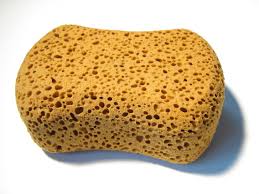sponge
英 [spʌndʒ]
美 [spʌndʒ]
- vt. 抹掉;用海绵擦拭;讨得
- vi. 采集海绵;过寄生生活;海绵般地吸收
- n. 海绵;海绵状物
使用频率:

中文词源
sponge 海绵生物,海绵,白吃,白喝,蹭
来自古英语 sponge,来自拉丁语 spongia,来自希腊语 spongos,海绵生物,海绵。该海绵生物为 海绵的原型。由于海绵的吸水性,引申词义白吃,白喝,蹭饭等。
英语词源
- sponge (n.)
- Old English sponge, spunge, from Latin spongia "a sponge," also "sea animal from which a sponge comes," from Greek spongia, related to spongos "sponge," of unknown origin. "Probably a loanword from a non-IE language, borrowed independently into Greek, Latin and Armenian in a form *sphong-" [de Vaan]. The Latin word is the source of Old Saxon spunsia, Middle Dutch spongie, Old French esponge, Spanish esponja, Italian spugna.
In English in reference to the marine animal from 1530s. To throw in the sponge "quit, submit" (1860) is from prizefighting, in reference to the sponges used to cleanse the faces of combatants between rounds (compare later throw in the towel). Sponge-cake is attested from 1808. - sponge (v.)
- late 14c., "to soak up with a sponge," also (transitive) "to cleanse or wipe with a sponge," from sponge (n.). The slang sense of "to live in a parasitic manner, live at the expense of others" is attested from 1670s; sponger (n.) in this sense is from 1670s. Originally it was the victim who was the sponge (c. 1600), because he or she was being "squeezed." Intransitive sense "dive for sponges" is from 1881. Related: Sponged; sponging.
权威例句
- 1. If your child's temperature rises, sponge her down gently with tepid water.
- 如果你孩子的体温上升,就用海绵蘸上温水轻轻地擦拭她的身体。
- 2. Fill a bowl with water and gently sponge your face and body.
- 在一只盆里放上水,轻轻地用蘸湿的海绵擦拭你的面部及身体。
- 3. Cover the base with a single layer of sponge fingers.
- 底部垫上一层海棉条。
- 4. His mind was like a sponge, ready to absorb anything.
- 他的脑子跟海绵似的,什么都能吸收。
- 5. The child is screwing water out of a sponge.
- 小孩正把海绵中的水挤出来.